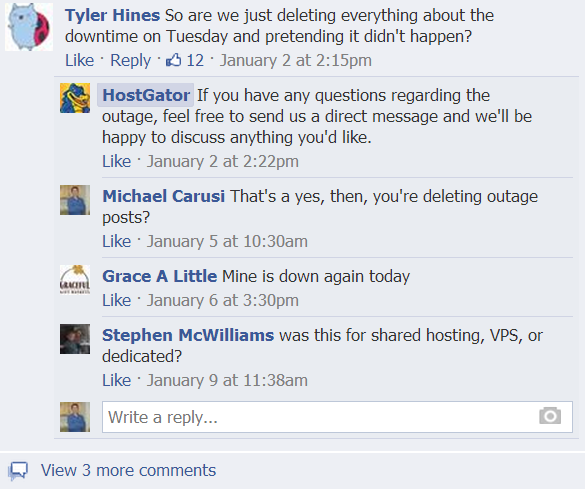I hope HostGator didn’t make any resolutions to retain customers in 2014. I’ve been a very loyal HostGator fan for years (even after the EIG acquisition that put so many people off), but they made two critical mistakes that made me decide to say goodbye, and unfortunately it isn’t an ending on good terms.
On New Years Eve, I sent out a big New Years edition of my inbound marketing newsletter, Inbound Insights, on which I had spent three hours filling to the brim with rich content about how businesses can use inbound marketing in the new year ahead. I host a lot of the content on my blog, so many links in the newsletter sent people to articles on my website.
The newsletter was sent out without problems, and I happened to be sitting down about three hours later and trying to pull up one of my blog articles, only to get an error. I pinged the server; no response. This was the fourth time in three months that HostGator (by extension of EIG) had gone down for a significant period of time, and coupled with the timing, I saw red.
Phone support and live chat were down too. Social media was the one channel by which customers could notify HostGator of the problems and vent their frustration and disbelief that this happened on New Years Eve, a prime day for E-commerce deals, nonprofit fundraising and newsletters like mine. What I saw instead was HostGator selectively responding to people, providing next to no information about what caused the outage or even a rough ETA, and dismissively saying that they “understood our frustration” over and over again. All the while, it was an agonizing amount of time between updates for people who rely on their websites to make a living.
My site was back up in about three hours, and despite the HostGator team’s ham-fisted customer service in response to the outage, I might have been willing to give them one more shot. Then I noticed what was going on the next day: All of the posts relating to the outage, along with their comment strings, were gone.
I initially didn’t think HostGator would go as far as trying to cover the outage up, but they did. Just look at this:
No denial. I took up HostGator’s offer to discuss this by direct message, suggesting this was done under duress by management. I received this in response:
No duress at all, those posts existed to provide realtime updates during the situation and subsequent to the outage they no longer served the purpose for which they were intended. Also, they weren’t deleted, just hidden from the wall and thus are still accessible via search and by anyone who commented within them and the like. Having said that, we certainly reserve the right to edit, modify and delete anything at any time from our FaceBook page, though we’re always happy to clarify the reasons when asked via this medium. It’s not an effort to hide anything, our outages are no secret, but once those posts served their purpose and were left for a couple days for anyone who cared to peruse them, we elected to simply hide them from the timeline.
Oh, really? Did you forget about the August outage updates or were those just less embarrassing because they didn’t happen on a big traffic day, HostGator? That’s also incorrect – hidden or deleted, posts can’t be found when they aren’t public. At most, you’ll be able to find the post in a Google search but it will redirect to a error message. When I pointed out that my interactions with the posts had disappeared from my activity log (directly contradicting what HostGator told me) they had this to say:
We still from time to time receive notifications that those posts have received new comments and the like. At any rate, was there something w could still assist you with at this point?
No HostGator, but you can certainly help yourselves by not lying to someone and then deflecting it.
At that point, I decided I couldn’t trust HostGator anymore. Never mind the frequent server outages and the fact that customer support has gone downhill since the acquisition by EIG; if HostGator had moved on to actively trying to remove discussions about its downtime and legitimate consumer complaints, and then lying when confronted about it, I didn’t feel comfortable using them as a web host for a website that’s essential to my business.
The Lessons Learned
1. Customers Get Upset At What They Don’t Know
As upset as people were at the obvious fact that their websites were unresponsive and not loading, people were even more frustrated at what they didn’t know. HostGator’s Facebook posts were a series of wishy washy updates encouraging patience without any explanation, ETA on a fix, or even an explanation of why they couldn’t be transparent about the process. Consumers lash out when they feel powerless, and HostGator’s Facebook timeline was plastered with evidence of it.
2. Don’t Try To “Prune” Your Facebook Page; People Notice
It’s no more appropriate to delete your own highly publicized postings once you perceive an event as “over” because it’s never over. It never disappears from your timeline and people have long memories. Beyond being unprofessional, it makes you appear as having something to hide or just being shady. Own up to your bad moments in business and handle them well enough that you’re proud of how the reactions look on Facebook so you don’t have to try and cover them up; it never works, anyway. They’re called screengrabs.
3. Don’t Lie
If you actually need to be told this, just stop and take a long, hard look at your business practices.

